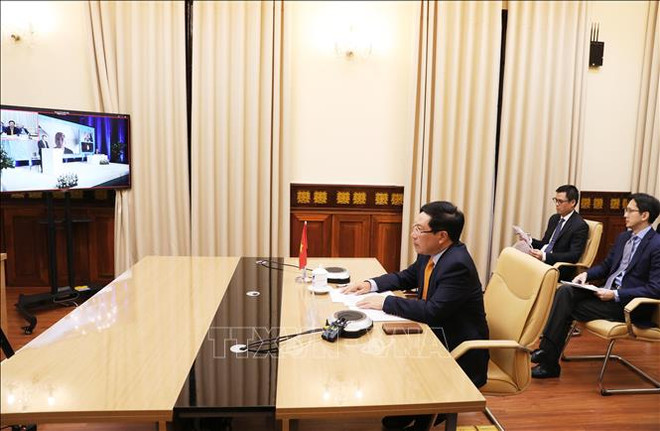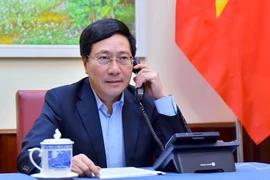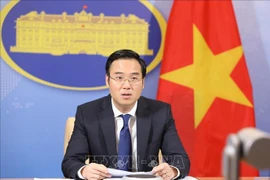 Deputy Prime Minister and Minister of Foreign Affairs Pham Binh Minh attends the UN Security Council high-level Arria-formula meeting “75 years from the end of the Second World War on European Soil – lessons learned for preventing future atrocities, responsibility of the Security Council.” (Source: VNA)
Deputy Prime Minister and Minister of Foreign Affairs Pham Binh Minh attends the UN Security Council high-level Arria-formula meeting “75 years from the end of the Second World War on European Soil – lessons learned for preventing future atrocities, responsibility of the Security Council.” (Source: VNA)Followingis the full test of the speech.
Thankyou, Mr. President, for bringing us together, though only virtually, on this importantoccasion.
Mr.President,
Seventy-fiveyears ago, the deadliest war in human history ended, but only after havingcaused untold suffering to hundreds of millions of people around the world.
Weare indebted to those who fought and sacrificed, in Europe, Asia, Africa, theAllied Powers, and lest we forget, the people of the former Soviet Union.
Thedefeat of the fascists and aggressors in the Second World War, and indeed inall wars and conflicts, proved that actions driven by expansionism, militarismand the thirst for conquest and dominance can never bend the will of nations tofight for their independence and freedom.
It alsodemonstrated that no force can triumph over the burning desire of nations forpeace and the shared values of humanity.
ForVietnam, the end of World War II helped bring a new beginning, as the nationemerged independent, after nearly a century under colonialism.
Risingfrom the ashes of World War II, nations have come together to rebuild a morepeaceful, stable and prosperous world.
Atthe center of these efforts emerged a collective security system anchored inthe UN Charter and international law.
Unfortunately,the end of the Second World War did not mean that peace was guaranteed.Colonialism and aggression continued to wreak havoc on nations. Vietnam, forone, suffered decades of devastating wars before our final victory in gainingindependence, unification and peace.
Therefore,given the lessons learnt from the World War II and from our own history, Vietnambelieves strongly that upholding international law, strengthened solidarity,cooperation and mutual trust on a global scale must underline our efforts topreserve the hard-won peace and stability in all parts of the world.
Theprinciples of the Charter, particularly those of sovereign equality,territorial integrity, non-use of force and peaceful settlementof disputes, have proven to be pivotal in preventing another disastrous worldwar and maintaining sustainable peace.
This was echoed at the Security Council earlier this year, as the Councilitself “reaffirmedits commitment to an international order based on international law as theindispensable foundation of a more peaceful, prosperous and just world.”
In Asia, the success of the Association of Southeast Asian Nations(ASEAN) in turning Southeast Asia from a war-torn anddeeply divided region into a region of friendship and cooperation is a powerfulexample. It also highlights the crucial role of regional organizations inmaintaining peace, security and stability in the region and beyond.
Let me conclude, Mr. President, with the wise words of President Ho Chi Minh, a UNESCOGreat Man of Culture, who led the nation of Vietnam to independence exactlyseventy-five years ago. He wrote, and I quote “The peopleeverywhere love peace, and they hate wars. People everywhere wants to live inindependence and freedom", end of quote. His words capture ourcollective desire to silence all guns, to end all wars,and achieve sustainable peace. Wecontinue to believe that our common human aspirationfor peace, freedom and justice, and our determination to defend ourindependence, sovereignty and territory, will prevail over confrontation, theuse of force and attempts for domination and conquest.
Ithank you, Mr. President./.


































